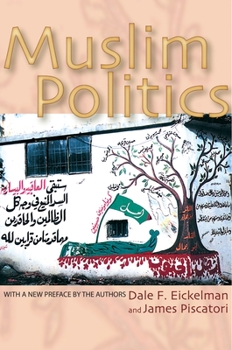Muslim Politics
(Part of the Princeton Studies in Muslim Politics Series)
Select Format
Select Condition 
Book Overview
In this updated paperback edition, Dale Eickelman and James Piscatori explore how the politics of Islam play out in the lives of Muslims throughout the world. They discuss how recent events such as September 11 and the 2003 war in Iraq have contributed to reshaping the political and religious landscape of Muslim-majority countries and Muslim communities elsewhere. As they examine the role of women in public life and Islamic perspectives on modernization and free speech, the authors probe the diversity of the contemporary Islamic experience, suggesting general trends and challenging popular Western notions of Islam as a monolithic movement. In so doing, they clarify concepts such as tradition, authority, ethnicity, pro-test, and symbolic space, notions that are crucial to an in-depth understanding of ongoing political events. This book poses questions about ideological politics in a variety of transnational and regional settings throughout the Muslim world. Europe and North America, for example, have become active Muslim centers, profoundly influencing trends in the Middle East, Africa, Central Asia, and South and Southeast Asia. The authors examine the long-term cultural and political implications of this transnational shift as an emerging generation of Muslims, often the products of secular schooling, begin to reshape politics and society--sometimes in defiance of state authorities. Scholars, mothers, government leaders, and musicians are a few of the protagonists who, invoking shared Islamic symbols, try to reconfigure the boundaries of civic debate and public life. These symbolic politics explain why political actions are recognizably Muslim, and why "Islam" makes a difference in determining the politics of a broad swath of the world.
Format:Hardcover
Language:English
ISBN:0691031843
ISBN13:9780691031842
Release Date:April 1996
Publisher:Princeton University Press
Length:240 Pages
Weight:0.80 lbs.
Dimensions:6.0" x 9.0"
Customer Reviews
2 ratings
Best Introductory Book
Published by Thriftbooks.com User , 21 years ago
Whenever someone comes to me wondering where they should begin when it comes to studying modern politics with an eye towards Islam, I inevitably point them towards this volume. One of the reasons that I do so is that, not only are the two authors widely respected in the field, the both come from different backgrounds. Piscatori I would roughly describe as a political scientist known for his work on Islam and the modern creation of the nation-state. Eickelman is a long established anthropologist who rose to fame working in the Maghreb. The resulting integration of both the politcal and the anthropological is about as ideal as one can get. Since Islamism has the fascinating quality of not being merely political but also being a religious movement employing and revolutionizing the use of tradition and cultural icons of Islamicity, the perspective of anthropology as a part of any attempt to grasp its dynamics I have found to be crucial.Here, you won't find the top 10 terrorist hit-list or a chart graph of all the members of Hamas, but you find a much more profound and broader picture of how tradition, religion and modern politics intersect with multifarious results in numerous global regions and some of the mechanisms at work. In general, it is an excellent work for gaining the tools with which to critically approach such phenomena in various Muslim societies across the globe.all intersect
A balanced account of the subject. Perhaps 'too nice'
Published by Thriftbooks.com User , 23 years ago
In Muslim Politics Dale Eickelman and James Piscatori have studied the idea of a Political Islam from a broad perspective. The title of the book itself betrays its breadth as it suggests, through the use of the plural 'politics' and the adjective Muslim - practitioner of Islam - rather than Islam itself, that Islam is a dynamic and evolving set of beliefs that have varied in time and space. This suggests that there can be no single explanation to account for the rise of Muslim politics and that a multiple criteria must be used to analyze the phenomenon. The book presents a number of arguments in its six chapters with examples from all over the Islamic world and among these are Tradition, Objectification and Fragmentation. The authors challenge Modernization theory's contention that tradition is irreconcilable with social and political development and the idea that Islamic legal frameworks may not be altered as they have been conceived as a reflection of divine revelation. They also show that references to the Islamic past are used as rallying points or symbols from which to draw inspiration for change in the present. My main concern and the reason I have not awarded a full 5 stars is that the authors seem to neglect or have chosen to ignore the very real violence that radical islamists have caused. No mention of Algeria -90-present, Egypt and the numerous terror attacks of the last decade, the mindless policies these groups often support, the Taliabn and a host of other less than ideal versions - at best - and downright abominable conditions that prevail as a result of many Muslim Political interpretations.






